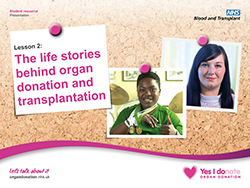Teen understanding and awareness of organ donation is vital to tackling a shortage of organ donors
Today’s teens have been highlighted as ‘change makers’ who can spark the family conversations needed to raise the number of organ donors.
NHS Blood and Transplant is asking teachers to introduce organ donation lessons, to raise awareness among pupils and prompt them to have wider discussions with family and friends.
The organisation has worked with teachers, clinicians, donor families and transplant patients to create its first dedicated organ donation education pack for secondary schools in England.
Today’s teens have been highlighted as ‘change makers’ who can spark the family conversations needed to raise the number of organ donors in the UK.

The pack, aimed at Key Stage 3 and Key Stage 4 students (14 to 16 year-olds) in England, includes lesson plans and materials linked to the Personal, Social and Health Education (PSHE) National Curriculum.
Sally Johnson, NHS Blood and Transplant Director of Organ Donation and Transplantation, said: "With thousands of people in need of a transplant, we need to make sure everyone understands the need for more organ donors. The UK currently has one of the lowest organ donation consent rates in Europe and three people die each day because of the shortage of donated organs.
“We believe education has a vital role to play in addressing people’s concerns about organ donation. Our research has highlighted the important role young people can play in stimulating discussion and debate in the family. By creating this education pack we are giving young people the facts about organ donation. We hope that this will not only make them think about what they would want to do themselves but it will also start discussions with their own families and friends.
“We’re grateful to everyone who has shared their personal stories for this education pack and look forward to organ donation becoming part of every child’s education.”
NHS Blood and Transplant’s pack is designed to give teachers materials to educate and engage students, empowering them to discuss organ donation with their family and friends.
The pack includes three lesson plans, each around 45 to 60 minutes, carefully linked to the PSHE National Curriculum. Resources include videos recorded with donor families and transplant patients, and take home fact sheets to facilitate conversations at home.
There are currently* 6,530 people on the transplant waiting list, including 172 children. During the last financial year, 4,143 adults benefitted from transplants from living and deceased donors, and 288 children. Sadly 459 adults and 12 children died during the last financial year while on the transplant waiting list.
Graham Brushett, a former lay member of UK Donation Ethics Committee, helped develop the resources. A former sixth form teacher in Bolton, Graham had a heart and kidney transplant at Wythenshawe Hospital in 2006.
He said young people are usually more open minded than adults about organ donation, but are less likely to understand the desperate need for donors unless they have had personal family experience.
“They always think it will happen to somebody else. Unless they know someone who is desperately ill waiting for a transplant they have usually not given it much thought.”
David Weston, 36, from Barnet in Greater London, is a teacher and a liver transplant recipient who runs the Teacher Development Trust.
He said: “School children often asked me how they know if you're 'really dead', and about whether you can choose which bits of your body you can donate. Many of them were surprised at just how many lives can be saved when one person donates.”
The young people whose stories feature in NHS Blood and Transplant’s education pack include Hannah Cochrane, 22, from Portsmouth, who describes life on the heart transplant waiting list while living with a temporary mechanical heart pump.
Hannah said: “No one likes to think or talk about death especially at an age where you should have years of life left in you. I hope this education pack opens the eyes of young people.”
Dawn Smith, 39, from Walsall, whose 15-year-old son Harry James died in a traffic accident in May, was interviewed for the pack about how her son’s heart, liver, a kidney and pancreas were transplanted into three people.
Dawn said: "I have had many of Harry's friends join the NHS Organ Donor Register since Harry donated. Many of his friends have contacted me to let me know what a wonderful gift he has given and have felt inspired by this.”
Charles Obadiaru, a 16 year old kidney recipient from Hertfordshire who features in the third video, talks about his life changing kidney transplant for Prune Belly Syndrome.
Charles said: “I do not think I have any friends on the Organ Donor Register and they are very surprised to hear I had a transplant. But I believe that with education the younger generation are more than capable of changing the minds of the older generation.”
NHS Blood and Transplant is sending details of the new education resources to headteachers and Personal, Social and Health Education (PSHE) teachers. The videos have been uploaded to Youtube, and the material will be promoted on NHS Blood and Transplant’s website and social media. The pack will also be promoted by partner charities and councils in key target areas.
The pack is now available as a free digital download at https://www.organdonation.nhs.uk/about-donation/educational-resources/
*Waiting list statistics as of January 22, 2016.
Ends
- For more information contact Stephen Bailey in the NHS Blood and Transplant Press Office on 0151 268 7017 or via Stephen.bailey@nhsbt.nhs.uk
- Alternatively contact the press office on 01923 367600 or via pressoffice@nhsbt.nhs.uk
- For out of hours enquiries please call: 0117 969 2444
Notes to editors
NHS Blood and Transplant (NHSBT) is a joint England and Wales Special Health Authority. Its remit includes the provision of a reliable, efficient supply of blood and associated services to the NHS in England and North Wales. It is also the organ donor organisation for the whole of the UK and is responsible for matching and allocating donated organs.
More than 22 million people in the UK have already signed onto the NHS Organ Donor Register. These people have joined the Register to record their decision to donate organs and/or tissue after their death for transplantation. This information is used by authorised medical staff to establish whether a person wanted to donate.
A previous NHS Blood and Transplant education pack dealt with all forms of donation, including blood, tissue, organ, and stem cell donation. The new pack is the first one to focus purely on organ donation.
To join the Organ Donor Register visit http://www.organdonation.nhs.uk/

